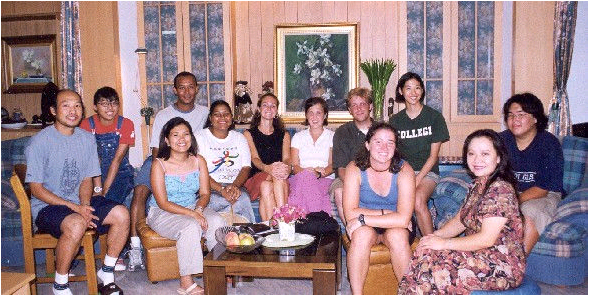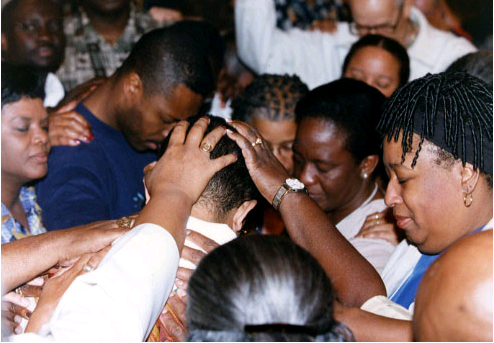
Pastor’s Storybook II–6
Command
of Christ #6

One morning Learner goes to Mr. Wise’ cousin’s house early, fearing that the police may have arrested Mr. Wise. He is still there. “Please come to my house,” Learner begs. “If they come for you, your cousin can warn us and we will hide you. Come now. The believers are waiting for you to lead us as we celebrate the Lord’s Supper.”
Mr. Wise replies, “I will come, but you must lead the services from now on. I showed you how.”
Learner leads a discussion at his house, for which Mr. Wise helped
him prepare. The group talks about our Lord’s command to break
bread and participate mystically in His body. Learner points to the
table with the cup and the bread. “Mr. Wise showed us how to
celebrate the Lord’s Supper just as he learned it in Scripture.
Let us talk about Why We Celebrate the Lord’s Supper.”
Please find in Matthew 26:26-27 what Jesus said that the bread and the cup are.
Find in Luke 22:1-22 the reason Jesus gave for us to celebrate the Lord’s Supper.
Find in 1 Corinthians 11:23-34:
Why we should not always combine the Lord’s Supper with a full meal.
Who
should participate in the Lord’s Supper.
Learner continues to explain to his flock, in his house, “Jesus tells us that the bread is His body and the cup is the new agreement God made in Jesus’ blood. In this celebration we know the Lord is very close to us. The new agreement between God and us lets us come near to Him through Jesus. Through Jesus, we have new, holy and eternal life by the power of His Holy Spirit. You see this in Acts 2:38 and Hebrews 9:15. By taking the Lord’s Supper, we strengthen our faith in God’s grace.”
Caregiver asks, “Why do you call it the new agreement?”
Learner hesitates so Mr. Wise answers. “Before Jesus died and rose from the dead, God accepted the blood of animal sacrifices to cover men’s sins. That was the old agreement, or covenant, made with the ancient nation of Israel, when Moses led them. The new agreement or covenant is based on Jesus’ blood. Instead of laws that brought death if you broke them, God now gives us His Holy Spirit to regenerate our hearts and guide us. We are no longer under the Old Testament law. Romans chapters 1 through 8 explain this.”
Learner says, “We celebrate the Lord’s Supper to remember Jesus and to show our faith in His sacrificial death until He comes back. We do not have to understand the mystery that is happening.”
“That is right,” Mr. Wise affirms. “We celebrate the Lord’s Supper regularly to receive blessing from the Lord for our obedience. A congregation that forgets the Lord’s Supper does not glorify Christ. The Lord’s Supper shows our unity with each other as a body and with Christ as our Head. Now, Learner will serve it to us.”
Mr. Wise asks Learner, “Do you recall in what the Lord’s Supper enables us to participate?”
Learner thinks a moment, then recalls, “1 Corinthians 10:16-17 tells us that partaking of the bread and cup is a participation in the body and blood of our Lord. We do not understand this very well. So we quote the words of Scripture when we observe the Lord’s Supper, and trust Him to work in our hearts. His supernatural work is in us, not in lifeless pieces of bread. We say just what Jesus says, “Take and eat; this is my body. Drink, this is my blood of the new covenant, as in Matthew 26:26-28.”
After the Communion service, Mr. Foolish says loudly, “The Lord’s Supper is a holy ceremony. My cousin told me that you need a pastor with official papers and an academic theological education to serve it. And if you do it too often, no one takes it seriously.”
Mr. Wise disagrees. “The New Testament church broke bread together the first day of the week in their homes, as Acts 20:7 reveals. Although God does not command us to break bread weekly, the apostles gave us the example. It strengthens discipline and worship in new congregations. Any group of believers, no matter how small or how new, should be encouraged to observe the Lord’s Supper. The Lord did not say to wait to obey Him until you have a well-educated pastor! Man-made requirements that hinder obedience to Jesus’ commands do much damage.”
Mr. Foolish complains, “Helper’s wife Rachel got in a fight with my wife three weeks ago. So none of us should take the Lord’s Supper until that is forgotten. Rachel should not take it for at least six months. My cousin told me this.”
“Mr. Foolish, you have forgotten that the Lord’s Supper is to celebrate our love for Christ and for each other. We do it because we obey Christ. We cannot deny it to everyone just because one person in the body sinned. Nobody could ever participate! And we do not use it as a whip to punish people who have erred, by excluding them for a long time. Galatians 6:1 teaches that when an erring believer repents, we restore him at once. That is what we did. Yes, our sin weakens our fellowship with God, and, in time, with other believers. But when we confess it and turn from it, God renews our fellowship. As 1 John 1:9 promises, If we confess our sins, He is faithful and just and will forgive us our sins and purify us from all unrighteousness. Helper’s wife Rachel apologized to your wife and asked forgiveness. So we welcomed her back to the Lord’s table.”
Mr. Foolish grumbles, “You may want to forgive her, but I will not!”
Mr. Wise asserts firmly, “A church body does not practice gossip and criticism but helps people find their way back to God. If Rachel has confessed her sin to God, He has forgiven her. The congregation must forgive her also. Let us look at The Steps We Take With Erring Believers to restore them, and what to do with those who do not repent.”
Find
in Matthew 18:15-17 the steps we take to correct believers who need
this discipline.

After celebrating Communion in Learner’s house, Mr. Wise tells the group, “I must say goodbye now. I must leave you. Maybe God will bring me back some day.” Tears fill his eyes. Several weep.
Learner says, “Mr. Wise has loved this congregation and taught us to obey Jesus’ commands so we can be a strong congregation when he is gone. He made sure that we have everything we need to grow and start other new congregations. We all thank you, brother.”
“Wait,” Mr. Wise says, “I forgot
something. There is another thing to be done.” He reads The
Requirements for an Elder.
Please find now in Titus 1:1-9 the requirements for becoming a shepherding elder.
Mr. Wise tells the group, “A congregation is not complete without godly leadership. I have observed Learner's life as a Christian for a few months now. He fulfils the Biblical requirements for an elder. His brother Helper also fulfils these requirements. I will lay hands on both of you now, to impart God’s anointing for you to take full responsibility for this flock.”
Mr. Foolish complains, “It is not correct for you, Mr. Wise, to authorize our leaders this way. You are an outsider. You are not of this community and are not a member of this congregation. My cousin says that bishops from the outside should not name leaders in a church. The church should name its own leaders, like the church in Antioch did.”
“Your cousin overlooked something,” Mr. Wise answers. “The church in Antioch could name leaders, as it did in Acts 13:1-3, because it was a mature church with many mature workers. But in Crete the congregations were all new and there were no experienced workers. So Paul told Titus, an experienced worker from the outside, to name and prepare the new leaders, in Titus 1:5. So Titus acted as an overseer for the new congregations, just as I have been doing for yours.”
To Learner and Helper Mr. Wise says, “You two are shepherding elders for this new congregation. You are young in your faith, but you have the Bible to lead you and the Holy Spirit to give you power. Learner, you will continue to train Helper, just as I trained you. Helper, you must train others and start new congregations. I will write you both letters and try to visit you when possible.”
“We hope so,” Learner says.
“Are you both willing to lead your congregation faithfully? Will you teach them to obey the commands of Jesus above all else? Will you humbly serve these people and all the believers to find their jobs to serve the congregation, as 1 Peter 5:1-4 requires?”
Learner and his brother promise solemnly before the group, “We will care for God’s people with His help.”
Mr. Wise asks the group, “Do you promise with God’s help to pray for these leaders and obey them as they teach the Word of God, and cooperate in the ministries that they equip you to do?”
They all answer “Amen!” except Mr. Foolish.
Mr. Wise lays hands on Learner and Helper and prays for their anointing as shepherds by the Holy Spirit, just as Titus did for the new shepherding elders of Crete
The group kneels to pray. Some weep. Learner knows that he now has the power of the Holy Spirit so that he and his brother can shepherd God’s flock.

Memorize Matthew 26:26-28 so you can speak the very words of Christ when you celebrate the Lord’s Supper.
Serve the Lord’s Supper regularly to all who come with repentant hearts.
Pass on the instructions and authority to serve the Lord’s Supper to new congregations.